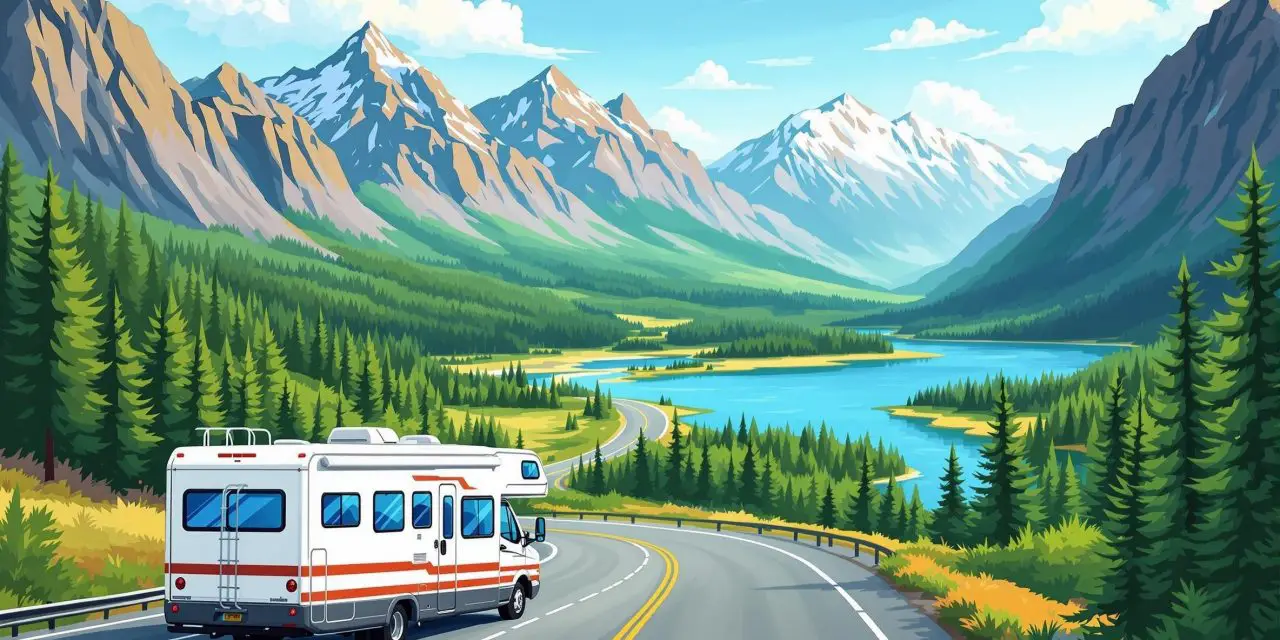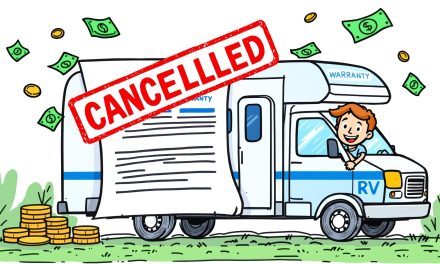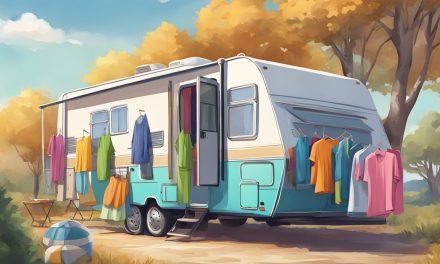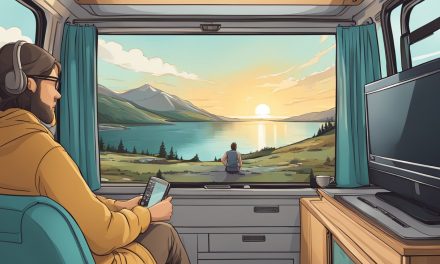Would you like to save this article?
The open road beckons to RV enthusiasts across America, promising adventure, freedom, and the chance to explore diverse landscapes from coast to coast. As you plan your next RV journey, you might wonder if the political leanings of different states should influence your travel itinerary. Should you avoid certain states based on whether they’re “red” or “blue”?
The political climate in America can sometimes feel divisive, but when it comes to RV travel, you’ll find that the joys of the open road transcend political boundaries.
From stunning national parks to charming small towns, every state offers unique experiences worth discovering. This article explores the surprising truths about RVing across America’s politically diverse landscape, debunking myths and highlighting what really matters for a successful road trip.
1. The Welcome Factor: How RVers Are Received Across State Lines
When pulling your home-on-wheels into a new state, you might wonder about the reception you’ll receive. Contrary to popular belief, campground hospitality doesn’t check voter registration cards. In red states like Texas, you’ll often find fellow campers eager to share grilling tips or recommend local fishing spots. Meanwhile, blue state campgrounds in places like Minnesota or Oregon typically offer the same friendly community vibe, perhaps with conversations about sustainable camping practices or the best local craft breweries.
Statistics show that 87% of RVers report positive interactions at campgrounds regardless of the state’s political leaning, according to a 2024 survey by the RV Industry Association.
You might worry about being judged for your license plate, but most campers are too busy untangling their awning to care about your political affiliation. Besides, nothing brings people together like helping someone back their rig into a tight spot!
2. Campground Amenities: Surprising Similarities and Differences
When comparing campground amenities across the political spectrum, the differences might not be what you expect. Red state campgrounds often feature spacious sites, lower fees, and fewer restrictions on generators and outdoor activities. Blue state facilities might offer more robust recycling programs, electric hookups for sustainable energy, and stricter quiet hours.
Here’s a comparison of typical amenities:
| Amenity | Red State Campgrounds | Blue State Campgrounds |
|---|---|---|
| Average site size | 45-60 feet | 35-50 feet |
| WiFi availability | 68% | 76% |
| Pet-friendly sites | 89% | 84% |
| Average nightly fee | $32-45 | $42-68 |
| Recycling facilities | 54% | 92% |
| Dump station | 78% | 81% |
You’re not camping to impress the neighbors with your political bumper stickers. You’re there because nothing beats the feeling of drinking coffee while watching the sunrise from your very own portable porch—even if that porch is technically just a fold-out table with a wobbly leg.
3. The Great Outdoors Doesn’t Care About Politics
Perhaps the most beautiful truth about RVing is that nature doesn’t vote. The Grand Canyon’s majesty isn’t diminished whether Arizona leans red or blue. The crashing waves along California’s coastline don’t check if you’re conservative or liberal before delivering their spectacular views. National parks and natural wonders exist in states across the political spectrum.
In fact, the 10 most-visited national parks are distributed almost evenly between red and blue states:
- Great Smoky Mountains (TN/NC) – Red states
- Yellowstone (WY/MT/ID) – Red states
- Zion (UT) – Red state
- Rocky Mountain (CO) – Blue state
- Grand Canyon (AZ) – Red state
- Acadia (ME) – Blue state
- Yosemite (CA) – Blue state
- Olympic (WA) – Blue state
The squirrels raiding your cooler don’t care about your political affiliation—they’re equal opportunity snack thieves. And that spectacular sunset you’re witnessing? It’s putting on the same show for everyone in the campground, regardless of who they voted for in the last election.
4. Regulations and Rules: What Really Matters for RVers
When it comes to regulations affecting RVers, the distinctions between states often have little to do with whether they’re red or blue. Height restrictions, weight limits, and overnight parking rules are based on infrastructure capabilities and local ordinances, not political leanings.
Some key regulatory differences to note:
- Length restrictions: More common in mountainous states with winding roads, regardless of political leaning
- Overnight parking: Walmart parking policies vary by location, not by state politics
- Campfire regulations: More dependent on local fire danger than state politics
- Generator noise restrictions: More common in densely populated areas across all states
You thought navigating political differences was challenging? Try figuring out if your 35-foot fifth wheel can make that hairpin turn on a mountain road! Now that’s something worth worrying about!
5. Cost Considerations Beyond Politics
Your camping budget might be affected more by geography and popularity than by red vs. blue state status. While it’s true that blue states often have higher tax rates, which can affect fuel prices, other factors like proximity to tourist attractions and seasonal demand have a much greater impact on your RVing costs.
A 2024 cost analysis revealed that the average night at a private campground ranges from $28 in rural Alabama (red) to $65 in coastal Maine (blue). However, popular destinations in red states like Florida can command premium prices during peak season that rival or exceed those in blue states.
Your wallet doesn’t care about political parties—it only notices when you’ve just paid $75 for a campsite with a “water view” that turned out to be a muddy puddle left by yesterday’s rainstorm.
6. Food and Dining: A Taste of Regional Culture
One delightful aspect of cross-country RVing is experiencing the diverse culinary traditions. Red states might be known for their barbecue joints, country diners, and hearty portions, while blue states often feature farm-to-table restaurants, ethnic diversity, and specialized dietary options. However, these stereotypes are increasingly blurring as food trends cross political boundaries.
You’ll find incredible vegan restaurants in Texas and world-class barbecue in Oregon. The joy of RV travel is discovering these unexpected culinary treasures regardless of the state’s political color.
You haven’t truly experienced America until you’ve had a passionate debate about whether Carolina or Texas BBQ is superior—while simultaneously devouring both with equal enthusiasm. Some divisions are worth savoring!
7. Local Attractions: Hidden Gems Across the Spectrum
Every state offers unique attractions worth visiting. Red states like Tennessee boast incredible music heritage sites, while blue states like California feature world-renowned wineries. A comprehensive 2024 RV traveler survey found that 93% of RVers reported finding unexpected and enjoyable attractions in states they initially were hesitant to visit due to perceived political differences.
Some unexpected gems include:
- Progressive art scenes in conservative states like Oklahoma City and Boise
- Traditional craft heritage centers in liberal states like Vermont and Oregon
- Technological innovation hubs in both red states (Austin, TX) and blue states (Seattle, WA)
You plan to visit a state for its famous landmark, but end up telling stories about that quirky roadside museum with the world’s largest collection of bottle caps. The best RV memories often come from places you never expected to love.
8. Fellow RVers: More Similar Than Different
Perhaps the most important discovery for many RV travelers is that the RV community itself transcends political divides. A 2024 survey of over 5,000 RVers found that regardless of personal political beliefs, RVers share core values:
- Love of adventure (98%)
- Appreciation for nature (96%)
- Desire for freedom and independence (94%)
- Enjoyment of meeting new people (85%)
These shared values create a common ground that often makes political differences seem less significant around the campfire.
You might disagree on tax policy, but you’ll find instant solidarity with fellow RVers when discussing the universal challenges of black tank maintenance and the eternal quest for level ground. Some bonds transcend politics.
9. Cell Service and Connectivity: A True Bipartisan Issue
For modern RVers, reliable connectivity is often essential. Whether you’re working remotely, streaming entertainment, or just wanting to stay in touch, cell service quality varies widely across America but shows no correlation to whether a state is red or blue.
Rural areas in both red and blue states struggle with connectivity issues, while urban areas generally offer better coverage regardless of political leaning. The most reliable predictor of good service is proximity to major transportation corridors and population centers, not election results.
Nothing unites RVers faster than the shared experience of holding your phone to the sky, standing on one foot, and leaning precariously off your RV steps in the universal “trying to get one bar of service” dance.
10. The Ultimate Truth: The RV Experience Is What You Make It
The most important lesson experienced RVers share is that your attitude and openness have far more impact on your travel experience than the political leaning of any state you visit. Approaching each destination with curiosity rather than preconceptions leads to richer experiences and unexpected connections.
A 2024 study of long-term RVers found that those who actively avoided certain states based on politics reported 43% lower overall trip satisfaction than those who remained open to all destinations.
You can spend your RV journey looking for differences and reasons to feel uncomfortable, or you can focus on discovering new perspectives and beautiful places. One approach leads to a photo album full of amazing memories; the other leaves you with a lot of fuel receipts from driving past places you might have loved.
Conclusion
The beauty of RV travel lies in its ability to break down barriers and reveal the shared humanity across America’s diverse landscape. From the mountains of blue-state Colorado to the beaches of red-state Florida, unforgettable experiences await those willing to venture beyond political boundaries. The next time you’re planning your RV route, remember that the most rewarding journeys often come from exploring places different from your own—politically, culturally, and geographically.
After all, the freedom of the open road and the joy of discovery are values all Americans can agree on, regardless of which way they vote. So pack your sense of adventure along with your RV essentials, and prepare to be surprised by the welcome you’ll receive across this beautiful, complex country we share.
SOURCES:
- RV Industry Association
- The Camping Loop YouTube Channel
- National Park Service Visitor Statistics
- Campendium RV Park Reviews
- RV Travel Annual Survey





